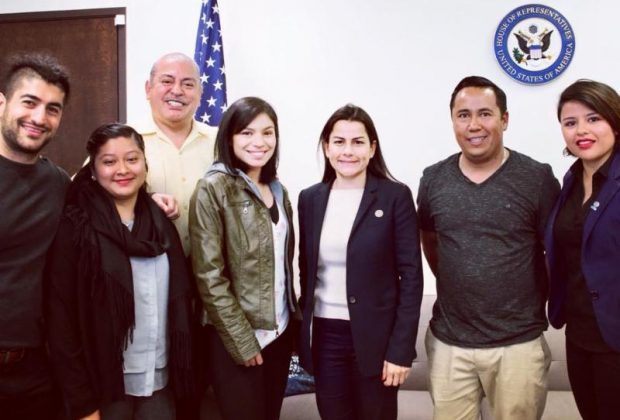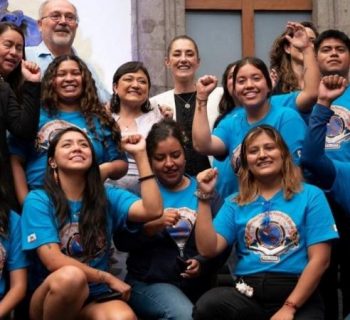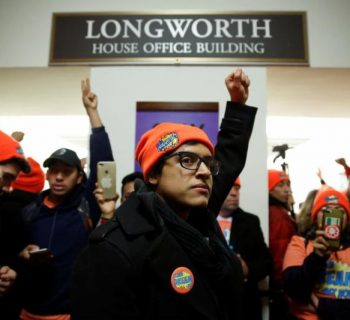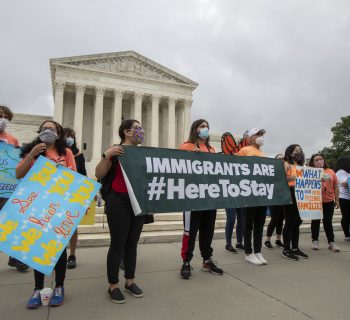On February 13th, just one month after DACA recipient Mayra Garibo's father passed away in Mexico, and one week after her second attempt to request humanitarian Advance Parole was denied; a New York federal judge blocked Trump's termination of DACA for a second time.
Although the new court order does not mention the reactivation of Advance Parole, which was arbitrarily suspended by USCIS, the CMSC continues to advocate for DACA recipients such as Mayra Garibo and Luis Tinoco who have extreme humanitarian cases in which the basic human right of family unification in times of sickness and death is being overlooked.
Fortunately, USCIS has accepted Mayra's application filed through attorney Naomi Cruz and with the advocacy of Reps. Alan Lowenthal and Nannette Barragán, we are hopeful that her current application for humanitarian Advance Parole will be approved.
Un beneficiario de la Acción Diferida solicitó sin éxito a las autoridades un permiso para salir temporalmente del país y despedirse de su abuelo en México, quien se encuentra gravemente enfermo.
Luis Fernando Tinoco, de 36 años, sabía que el Servicio de Ciudadanía e Inmigración dejó de recibir ese tipo solicitudes tras la eliminación el año pasado de este programa, por lo que su petición fue un llamado a la compasión.
"Me quiebra el corazón pensar en que no puedo verlo, no puedo abrazarlo, no puedo expresarle cuánto lo quiero", lamentó el inmigrante que vio a su abuelo por última vez hace 30 años cuando emigró de México hacia Estados Unidos siendo un menor de edad.
Read More____________________________________________________________________________________________________

A musket from the 18th century, when the Second Amendment was written, and an assault rifle of today. Rarely in my lifetime have I seen the type of civic engagement schoolchildren and their supporters demonstrated in Washington and other major cities throughout the country this past Saturday. These demonstrations demand our respect. They reveal the broad public support for legislation to minimize the risk of mass killings of schoolchildren and others in our society.
That support is a clear sign to lawmakers to enact legislation prohibiting civilian ownership of semiautomatic weapons, increasing the minimum age to buy a gun from 18 to 21 years old, and establishing more comprehensive background checks on all purchasers of firearms. But the demonstrators should seek more effective and more lasting reform. They should demand a repeal of the Second Amendment.
Concern that a national standing army might pose a threat to the security of the separate states led to the adoption of that amendment, which provides that "a well regulated militia, being necessary to the security of a free state, the right of the people to keep and bear arms, shall not be infringed." Today that concern is a relic of the 18th century.
For over 200 years after the adoption of the Second Amendment, it was uniformly understood as not placing any limit on either federal or state authority to enact gun control legislation. In 1939 the Supreme Court
unanimously held that Congress could prohibit the possession of a sawed-off shotgun because that weapon had no reasonable relation to the preservation or efficiency of a "well regulated militia."
Read More____________________________________________________________________________________________________
We need your help more than ever before in order to continue to fight for Dreamers and Advance Parole!
As you may know, the Supreme Court has recently denied President Trump's request for rescinding DACA. However, the appeals court will rule in the near future, but for now DACA is still in place as before September 5, 2017, but without Advance Parole, except for "deserving cases" as in the case of CMSC Dreamer Mayra Garibo.
Thus, we are asking for your support as a beneficiary or supporter of our program, and because without it, we will not be able to continue to advocate for Dreamers' legalization, a path to citizenship and for our next projects: the California-Mexico Dreamers book publication and full-length documentary.
All donations are tax-deductible
____________________________________________________________________________________________________
____________________________________________________________________________________________________
Photo Credit: Associated Press
Linda Carol Brown was raised in Topeka, Kan., and all she wanted was to go to the Sumner School. But she was black, and the elementary school four blocks from her home was segregated, open only to white students.
The family received a registration form for the school in 1952, apparently by mistake. The school's refusal to accept her led her father - Rev. Oliver L. Brown, an assistant minister at St. Mark's African Methodist Episcopal Church - to meet with the NAACP.
Linda Brown Thompson spoke on the anniversary of Brown v. Board of Education in Ann Arbor, Mich., on Jan. 12, 2004. (The Washington Post)
He "felt that it was wrong for his child to have to go so far a distance to receive a quality education," Ms. Brown said in "Eyes on the Prize."
Ms. Brown, a third-grader at the time, went on to become the symbolic center of Brown v. Board of Education, the transformational 1954 Supreme Court decision that bore her father's name and helped dismantle racial segregation in the United States.
Read More

 Read full newsletter here: http://conta.cc/2uwlGfQ
Read full newsletter here: http://conta.cc/2uwlGfQ 














